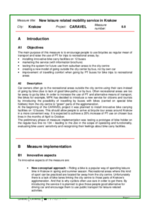Bike on bus: leisure-related mobility services
Summary
Krakow introduced bike-carrying facilities on selected bus lines to encourage its citizens to cycle more frequently to recreational areas in the city and to help create a bicycle-friendly city.
Implementing sustainable mobility
Prior to measure implementation, cycling in Krakow was neither safe nor comfortable due to the lack of bike lanes. As a result, people were discouraged from using their bicycles to reach recreational areas. The launch of new leisure mobility service in Krakow, comprising the installation of bike-carrying facilities on public transport buses on certain city lines during the summer months, was seen as a way of stimulating the use of bicycles as a means of transportation and of enabling cyclists to make use public transportation when making trips to recreational areas in the city.
Specifically, the objectives were to:
- implement a new leisure-related mobility service in Krakow in order to increase the combined use of bikes and public transport to reach recreational areas;
- organise a marketing campaign to disseminate information about the new mobility service; and
- test the system for future implementation as a way of travelling from the suburbs into the city centre.
Progress
The demonstration phase began with the production of 15 bike mounts for public transport buses. The public transport operator MPK constructed and tested a prototype of a bike mount, then produced all 15 of them using its own labour resources. Bus routes and lines were selected and special bus schedules were prepared. Training was given to 100 bus drivers on how to use the new bike transportation equipment.
The new service was launched in July 2006, accompanied by a communication and marketing campaign. News about the introduction of the leisure-related mobility service in Krakow was disseminated locally and nationally via press, radio, television, Internet and direct meetings with potential users. It attracted great interest from public transport operators in other Polish cities.
Outcomes
The new leisure-related mobility service was widely welcomed by the citizens of Krakow and vehicles equipped with bike-carrying facilities are in operation on selected lines each year in the summer months.
- Awareness of the bike mounts on public transport buses increased in the seasons following the launch of the service and cyclists now represent a new group of public transport passengers in Krakow.
- Bike-carrying facilities were most frequently used on the 134 line (heading to the zoo).
- Economic indicators (operating costs and operating revenues) related to the provision of the new leisure-related mobility service were shown to have had a low impact on the overall operation of the selected bus lines.








